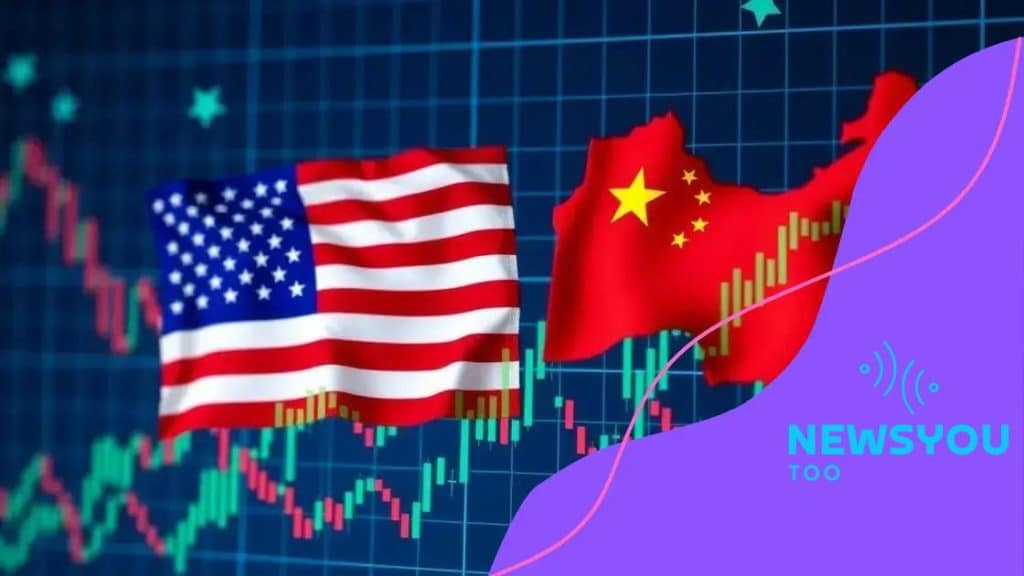US-China trade war impacts markets: what you need to know

Anúncios
The US-China trade war impacts global markets by influencing prices, altering consumer behavior, and prompting businesses to adapt their strategies amid shifting economic conditions and tariffs.
Strong market fluctuations often arise from political tensions, like the US-China trade war impacts markets in ways that affect everyday consumers and investors. Have you felt the ripple effects in your investments or purchases? Let’s dive deeper into this issue.
Anúncios
Understanding the US-China trade war
Understanding the US-China trade war is essential for grasping its effects on global economics. This conflict began in 2018 and has since influenced countless markets. It’s important to explore the reasons behind this trade war and how it shapes our world.
What sparked the trade conflict?
The trade dispute initially arose from concerns over trade imbalances and intellectual property theft. The United States aimed to reduce its trade deficit with China by imposing tariffs. These tariffs led to a series of retaliatory measures, further escalating the situation.
Key impacts on economies
As the trade war evolved, many economies felt its effects. Here are some major impacts:
Anúncios
- Increased prices on goods due to tariffs.
- Supply chain disruptions, affecting manufacturing efficiency.
- Investor uncertainty leading to market volatility.
Additionally, both countries changed their international trade strategies. For instance, China began to seek new markets for its exports, while the U.S. encouraged domestic production. This shift may lead to long-term changes in the global economic landscape.
International businesses have also adjusted to the ongoing trade tensions. Companies are exploring alternatives to avoid tariffs and protect profits. Such measures include relocating production or finding new suppliers in different regions.
Consumer behavior shifts
The US-China trade war has altered consumer behavior. People become more cautious of their spending as prices rise. They may also choose local products over imported ones, hoping to support domestic growth.
It’s vital for consumers to stay informed about how these trade dynamics affect prices and availability of goods. Understanding the broader implications helps shoppers make better decisions and anticipate changes in the market.
As the trade war continues, the relationship between the two nations remains tense. Many experts advise keeping an eye on developments since they will likely shape global markets and policies for years to come.
Key economic impacts on global markets
The key economic impacts on global markets due to the US-China trade war are significant. As both nations navigate their tense relationship, we see various consequences ripple through economies worldwide.
Trade Tariffs and Prices
One of the most visible impacts is the increase in tariffs on goods. These tariffs have caused prices to rise, affecting consumers and businesses alike. The resulting costs push consumers to reconsider their purchases and businesses to adjust their pricing strategies.
Global Supply Chains Disrupted
The trade war has also disrupted international supply chains. Many companies rely on a seamless flow of materials and products across borders. When tariffs are implemented or trade routes become uncertain, companies must adapt.
- Businesses may relocate production to avoid tariffs.
- They might seek alternative suppliers or markets.
- Some industries have faced shortages of crucial components.
This unpredictability makes it challenging for companies to plan for the future, which can stifle innovation and growth. Investors might hesitate to commit to projects due to uncertainty in the market.
Furthermore, countries with strong ties to either the US or China have also felt the effects. For instance, countries in the Asia-Pacific region experience unique pressures to maintain their trade relationships, while also needing to comply with changing regulations.
Investment Fluctuations
Investor confidence has taken a hit, leading to market volatility. Stocks can rise or fall dramatically in response to news regarding the trade war. It’s vital for investors to keep an eye on trade negotiations and economic indicators.
The impacts of these economic shifts can be widespread. Understanding the key economic impacts on global markets can empower consumers and businesses to make informed decisions. As trends evolve, those who stay informed will be better equipped to navigate challenges.
How businesses are adapting to changes

Businesses are continually finding ways to adapt to the transformations brought about by the US-China trade war. These adaptations are crucial for maintaining competitiveness and profitability in a constantly shifting market landscape.
Innovative Strategies for Production
Many companies are rethinking their production strategies. To avoid the costs of tariffs, some businesses are relocating their production sites to countries with lower tariffs. This shift is not just about moving operations; it’s also about ensuring quality and efficiency.
- Switching suppliers to those not affected by tariffs.
- Investing in automation to increase efficiency.
- Exploring alternative materials or methods.
This proactive approach can help businesses mitigate risks and adapt to changes quickly. By reevaluating their supply chains, firms can maintain a steadier flow of goods.
Emphasizing Local Markets
Another way companies are responding is by emphasizing local markets. As tariffs impact prices, businesses are focusing on consumers within their own countries. They are developing marketing strategies that highlight local products, which resonate well with consumers’ desire to support domestic industries.
This shift can lead to increased brand loyalty and a more engaged customer base. Companies are often finding that consumers are willing to pay a bit more for products made locally or with local labor.
Moreover, businesses are reevaluating their pricing strategies. By adjusting prices thoughtfully, they can remain competitive while still covering additional costs incurred from tariffs. This careful balance helps them keep their customer base while addressing changes in the market.
Leveraging Technology
Technology plays a significant role in how businesses adapt. Many are investing in digital solutions to streamline operations. Utilizing data analytics can help companies understand market trends and consumer behavior better. This understanding allows them to adjust their offerings more effectively.
For example, implementing inventory management systems can prevent stock shortages or overages, ensuring that businesses can meet consumer demand even in uncertain times. Overall, adaptability is key for businesses navigating the complexities of the current trade landscape.
Trends in consumer behavior due to tariffs
Trends in consumer behavior due to tariffs are becoming increasingly noticeable as individuals navigate the effects of the US-China trade war. These changes are significant and reflect the evolving preferences of shoppers today.
Price Sensitivity
As tariffs increase, many consumers are becoming more price sensitive. They are looking for ways to save money, which can lead to changes in buying habits. When prices rise due to added tariffs, shoppers often reconsider their purchases.
- Choosing generic or store brands over national brands.
- Delaying big-ticket items to see if prices will drop.
- Seeking out sales or discounts more actively.
This heightened sensitivity can impact businesses, as they may need to adjust pricing strategies or enhance marketing efforts to attract cost-conscious consumers.
Preference for Local Products
Many consumers are starting to prefer local products. As the trade war leads to inflated prices on imported goods, people are becoming more aware of the benefits of supporting local businesses. This trend promotes community growth and can lead to a stronger local economy.
Local products often appeal to buyers due to perceived quality and fresh ingredients. Consumers appreciate knowing where their goods come from, and this can foster brand loyalty. In addition, supporting local businesses aligns with growing sentiments toward sustainability.
Shift to Online Shopping
Another significant trend is the movement toward online shopping. With tariffs affecting prices and product availability, consumers are increasingly turning to e-commerce for better deals. Online retailers often provide competitive pricing and a wider range of products.
The convenience of online shopping is hard to ignore. As consumers adjust to changing market dynamics, many are using technology to find the best products at the best prices. This transition can change how businesses operate, pushing them to enhance their online presence and e-commerce strategies.
Future outlook for US-China trade relations
The future outlook for US-China trade relations is a topic of significant interest as global economies adapt to changing dynamics. Factors influencing these relations continue to evolve, leaving many to wonder about possible outcomes.
Political Influences
One crucial aspect that will shape the future of these relations is the political climate. With changing leadership in either country, trade policies may shift dramatically. It’s essential to keep an eye on upcoming elections and policy announcements that could impact trade agreements.
Economic Conditions
Economic conditions in both countries will also play a pivotal role. As the economies of the US and China progress, their trade relationships might change accordingly. For instance, if one country faces economic struggles, it could turn to protectionist measures that harm bilateral trade.
In contrast, a strengthening economy may lead to more collaboration and favorable trade agreements. Businesses on both sides should monitor these conditions closely to strategize for potential changes.
Global Trade Dynamics
The broader landscape of global trade dynamics will influence US-China relations as well. As countries establish new trade relationships and partnerships, the two nations may need to adapt their strategies. Changes in international supply chains could either benefit or strain trade interactions between the US and China.
Furthermore, emerging markets may present new opportunities or challenges, leading to adjustments in how the US and China engage with each other and the world.
Technological Competition
A significant factor that cannot be overlooked is the ongoing technological competition between both countries. As the US and China race to lead in innovation, this rivalry could lead to stricter trade policies regarding technology and intellectual property.
The impact of these competitive dynamics could further complicate trade negotiations and agreements. Businesses may need to rethink their strategies in light of this growing competition.
FAQ – Frequently Asked Questions about US-China Trade Relations
What is the US-China trade war?
The US-China trade war refers to the economic conflict between the two nations characterized by tariffs and trade barriers imposed on each other.
How do tariffs affect consumers?
Tariffs often lead to increased prices on imported goods, making consumers more price-sensitive and likely to switch to local products.
What impact does the trade war have on global markets?
The trade war can cause significant fluctuations in global markets, affecting stock prices, supply chains, and international trade dynamics.
How are businesses adapting to these changes?
Businesses are adapting by relocating production, focusing on local markets, and leveraging technology to stay competitive amidst changing trade policies.





